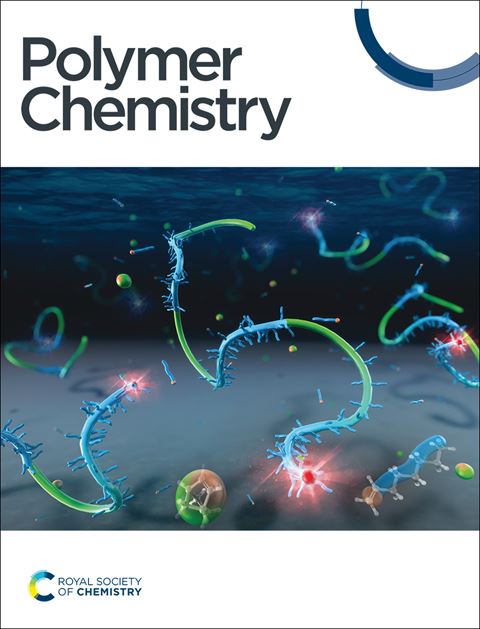具有可调机械性能和可切换介电常数的螺吡喃基超分子弹性体
IF 4.1
2区 化学
Q2 POLYMER SCIENCE
引用次数: 0
摘要
有机硅弹性体被广泛应用于各种领域,每种应用都需要不同的特性和功能。要想应用如此广泛,就需要有机硅具有易于调整或切换的特性。我们用新型金属超分子聚硅氧烷证明了这一点。以氯化锌为催化剂,聚(二甲基硅氧烷-共-3-氨丙基甲基硅氧烷)与环氧改性的螺吡喃(SP)发生了反应。我们发现,氯化锌具有催化剂的作用,可以形成金属超分子聚合物。我们通过 DSC、拉伸试验和 DMA 研究了氯化锌用量对合成材料的热性能和机械性能的影响。通过紫外可见光谱和介电常数测量,研究了 SP 不仅作为物理交联剂,还作为分子开关的能力。研究发现,根据 ZnCl2 用量的不同,介电常数在紫外光照射后会增加或降低。此外,所开发的材料可以像热塑性弹性体一样进行再加工。此外,只需添加氯化锌,就可将其溶解度从几乎不溶于任何溶剂调整为高溶解度。本文章由计算机程序翻译,如有差异,请以英文原文为准。

Spiropyran-based supramolecular elastomers with tuneable mechanical properties and switchable dielectric permittivity†
Silicone elastomers are widely used in various applications, each demanding different properties and functionalities. To be used in such a broad spectrum, silicones with easily tunable or switchable properties are needed. We showed this is achievable with novel metallo-supramolecular polysiloxanes. Poly(dimethylsiloxane-co-3-aminopropylmethylsiloxane) was reacted with an epoxy-modified spiropyran (SP) in the presence of ZnCl2 as a catalyst. We have found that the ZnCl2 allows the formation of metallo-supramolecular polymers with tuneable mechanical propertiers. The influence of the amount of ZnCl2 used on the thermal and mechanical properties of the synthesized materials was investigated by DSC, tensile test, and DMA. The ability of SP to act not only as a physical cross-linker, but also as a molecular switch was investigated by UV-Vis spectroscopy and dielectric permittivity measurements. It was found that depending on the amount of ZnCl2 used, the dielectric permittivity can either increase or decrease after exposure to UV or visible light, respectively. Additionally, the developed materials can be reprocessed similarly to thermoplastic elastomers. Furthermore, their solubility can be manipulated from insoluble in practically any solvent to highly soluble by simply adding ZnCl2.
求助全文
通过发布文献求助,成功后即可免费获取论文全文。
去求助
来源期刊

Polymer Chemistry
POLYMER SCIENCE-
CiteScore
8.60
自引率
8.70%
发文量
535
审稿时长
1.7 months
期刊介绍:
Polymer Chemistry welcomes submissions in all areas of polymer science that have a strong focus on macromolecular chemistry. Manuscripts may cover a broad range of fields, yet no direct application focus is required.
 求助内容:
求助内容: 应助结果提醒方式:
应助结果提醒方式:


